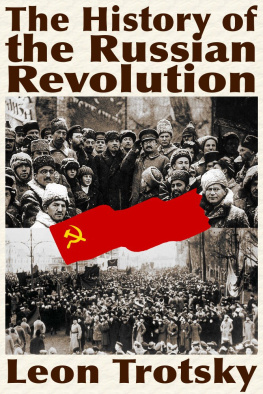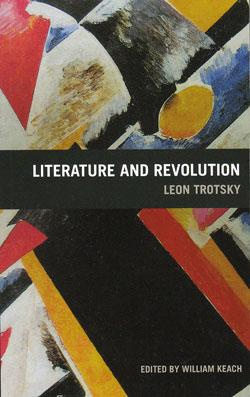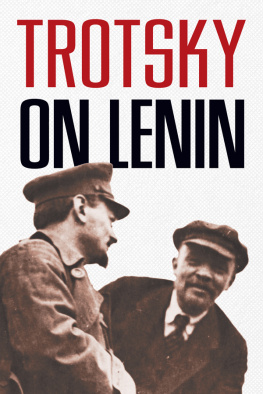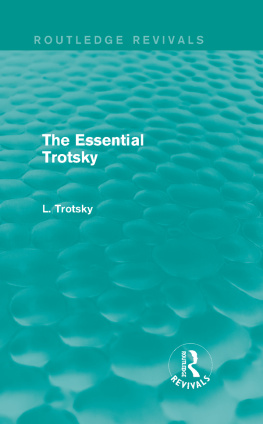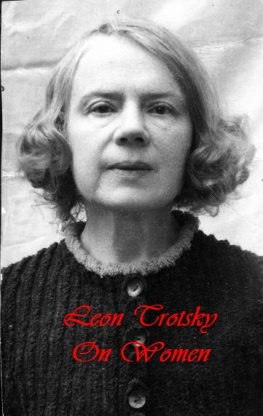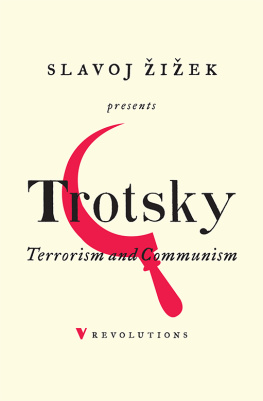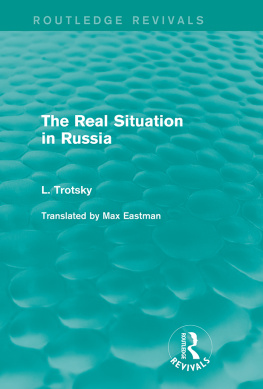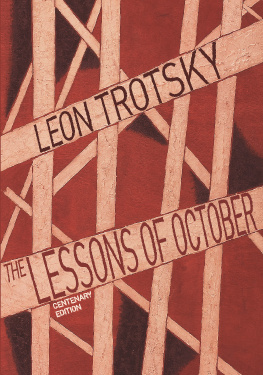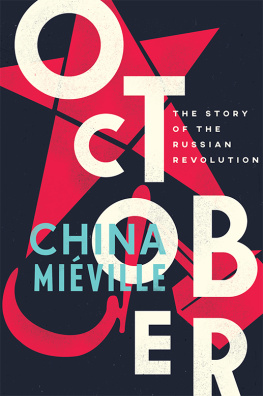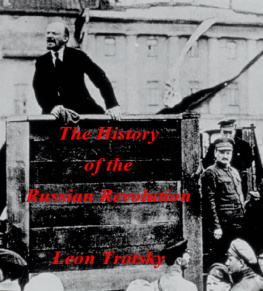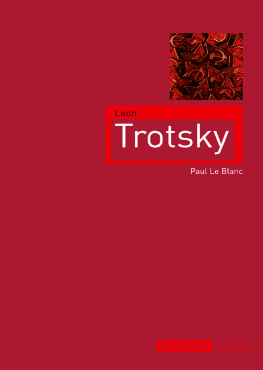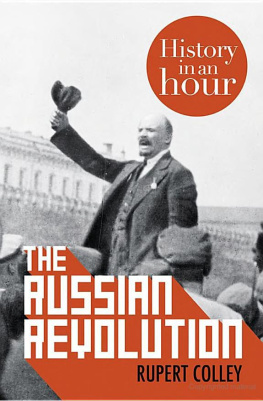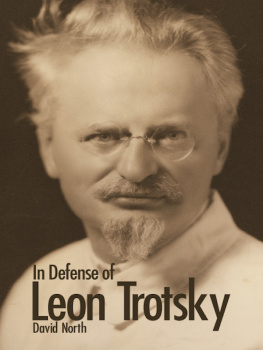The History of the Russian Revolution

Leon Trotsky
First published in Russian in 1930 and 1932
Translated by Max Eastman, 1932
Library of Congress Catalog Card Number 8083994
ISBN 0913460834
Transcribed for the World Wide Web by John Gowland (Australia), Alphanos Pangas (Greece) and David Walters (United States) 1997 through 2000.
Converted to eBook format by Kollektiv Yakov Perelman in October 2013, from the on-line version of The History of the Russian Revolution available at the Trotsky Internet Archive.
EBook proofed and reset by Pablo Stern (Britain), 2017, with a new cover inspired by David King's 60 th anniversary cover.
Cover photos: Lenin and Trotsky at the second anniversary celebration of the October Revolution in 1919; The October Revolution.
Table of Contents
VOLUME ONE
The Overthrow of Tzarism
VOLUME TWO
The Attempted Counter-Revolution
VOLUME THREE
The Triumph Of The Soviets
Preface
During the first two months of 1917 Russia was still a Romanov monarchy. Eight months later the Bolsheviks stood at the helm. They were little know to anybody when the year began, and their leaders were still under indictment for state treason when they came to power. You will not find another such sharp turn in history especially if you remember that it involves a nation of 150 million people. It is clear that the events of 1917, whatever you think of them, deserve study.
The history of a revolution, like every other history, ought first of all to tell what happened and how. That, however, is little enough. From the very telling it ought to become clear why it happened thus and not otherwise. Events can neither be regarded as a series of adventures, nor strung on the thread of a preconceived moral. They must obey their own laws. The discovery of these laws is the authors task.
The most indubitable feature of a revolution is the direct interference of the masses in historical events. In ordinary times the state, be it monarchical or democratic, elevates itself above the nation, and history is made by specialists in that line of business - kings, ministers, bureaucrats, parliamentarians, journalists. But at those crucial moments when the old order becomes no longer endurable to the masses, they break over the barriers excluding them from the political arena, sweep aside their traditional representatives, and create by their own interference the initial groundwork for a new rgime. Whether this is good or bad we leave to the judgement of moralists. We ourselves will take the facts as they are given by the objective course of development. The history of a revolution is for us first of all a history of the forcible entrance of the masses into the realm of rulership over their own destiny.
In a society that is seized by revolution classes are in conflict. It is perfectly clear, however, that the changes introduced between the beginning and the end of a revolution in the economic bases of the society and its social substratum of classes, are not sufficient to explain the course of the revolution itself, which can overthrow in a short interval age-old institutions, create new ones, and again overthrow them. The dynamic of revolutionary events is directly determined by swift, intense and passionate changes in the psychology of classes which have already formed themselves before the revolution.
The point is that society does not change its institutions as need arises, the way a mechanic changes his instruments. On the contrary, society actually takes the institutions which hang upon it as given once for all. For decades the oppositional criticism is nothing more than a safety valve for mass dissatisfaction, a condition of the stability of the social structure. Such in principle, for example, was the significance acquired by the social-democratic criticism. Entirely exceptional conditions, independent of the will of persons and parties, are necessary in order to tear off from discontent the fetters of conservatism, and bring the masses to insurrection.
The swift changes of mass views and moods in an epoch of revolution thus derive, not from the flexibility and mobility of mans mind, but just the opposite, from its deep conservatism. The chronic lag of ideas and relations behind new objective conditions, right up to the moment when the latter crash over people in the form of a catastrophe, is what creates in a period of revolution that leaping movement of ideas and passions which seems to the police mind a mere result of the activities of demagogues.
The masses go into a revolution not with a prepared plan of social reconstruction, but with a sharp feeling that they cannot endure the old rgime. Only the guiding layers of a class have a political program, and even this still requires the test of events, and the approval of the masses. The fundamental political process of the revolution thus consists in the gradual comprehension by a class of the problems arising from the social crisis the active orientation of the masses by a method of successive approximations. The different stages of a revolutionary process, certified by a change of parties in which the more extreme always supersedes the less, express the growing pressure to the left of the masses so long as the swing of the movement does not run into objective obstacles. When it does, there begins a reaction: disappointments of the different layers of the revolutionary class, growth of indifferentism, and therewith a strengthening of the position of the counter-revolutionary forces. Such, at least, is the general outline of the old revolutions.
Only on the basis of a study of political processes in the masses themselves, can we understand the role of parties and leaders, whom we least of all are inclined to ignore. They constitute not an independent, but nevertheless a very important, element in the process. Without a guiding organisation, the energy of the masses would dissipate like steam not enclosed in a piston-box. But nevertheless what moves things is not the piston or the box, but the steam.
The difficulties which stand in the way of studying the changes of mass consciousness in a revolutionary epoch are quite obvious. The oppressed classes make history in the factories, in the barracks, in the villages, on the streets of the cities. Moreover, they are least of all accustomed to write things down. Periods of high tension in social passions leave little room for contemplation and reflection. All the muses even the plebeian muse of journalism, in spite of her sturdy hips have hard sledding in times of revolution. Still the historians situation is by no means hopeless. The records are incomplete, scattered, accidental. But in the light of the events themselves these fragments often permit a guess as to the direction and rhythm of the hidden process. For better or worse, a revolutionary party bases its tactics upon a calculation of the changes of mass consciousness. The historic course of Bolshevism demonstrates that such a calculation, at least in its rough features, can be made. If it can be made by a revolutionary leader in the whirlpool of the struggle, why not by the historian afterwards?
However, the processes taking place in the consciousness of the masses are not unrelated and independent. No matter how the idealists and the eclectics rage, consciousness is nevertheless determined by conditions. In the historic conditions which formed Russia, her economy, her classes, her State, in the action upon her of other states, we ought to be able to find the premises both of the February revolution and of the October revolution which replaced it. Since the greatest enigma is the fact that a backward country was the

